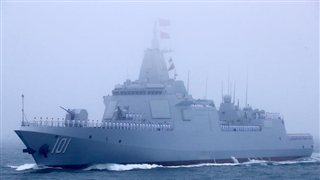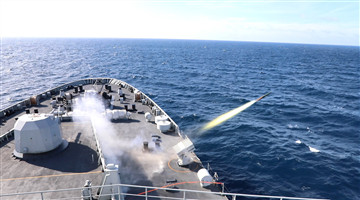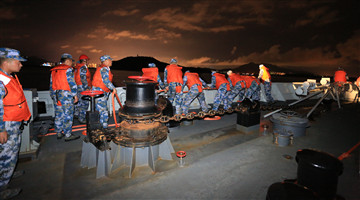
Having been born and raised in an inland province, I had always pictured life by the sea as blue waves shimmering under the ever-present sunshine, palm trees swaying in the warm breeze and fresh coconut water and succulent seafood always within reach.
That was until I visited Zhongjian Island in the southwestern Xisha Islands in the South China Sea.
Blue waves certainly shimmered under bright sunshine, but the water was too shallow for our big ship to anchor, so we had to transfer to a small boat. The bumpy passage made many of the passengers sick.
There were palm trees, but they were not swaying. Instead, they were violently shaken by the howling winds at night. They were all different sizes - some were just saplings - and they had been planted irregularly. The few coconuts I saw were too small to eat, and, of course, the seafood was a luxury, just like in inland regions.
However, we were lucky enough to have fresh, drinkable water, a 4G communication network, air conditioners to combat the humidity and heat, and fresh, leafy greens to eat straight out of the vegetable plot.
Qiu Hua, who is the Xisha Islands' longest-serving resident, said that in the early 2000s, he relied on handwritten letters to contact his girlfriend - now his wife - and the weather dictated if the letters could be shipped out or not.
"I wrote every day. If the ship came in 25 days, I sent 25 letters. If it came in 45 days due to typhoons, I sent 45 letters. My girlfriend did the same. Whenever I received her letters, I wouldn't allow myself to read them all at once; only one every day, so I would have something to read before the ship's next visit," he said.
I felt heartbroken when I heard this.
Before 2008, when desalination equipment was installed, the sailors often contracted skin diseases because a shortage of fresh water meant their clothes were washed in brackish seawater.
The island is frequently hit by typhoons and high waves. That makes the arrival of the supply ship uncertain, but reinforces the possibility of running out of food. Many of the sailors have eaten tinned goods produced before they were born.
Generations of sailors stayed and made the island their home, despite long periods away from their families. They took everything nature could throw at them and unswervingly safeguarded national sovereignty.
Although short, my trip made me realize that we take their service for granted, never understanding how much they endure and sacrifice to guarantee the peaceful lives we live.
I hope that whenever they meet a member of the military, people will say from the bottom of their hearts: "Thank you for your service."











